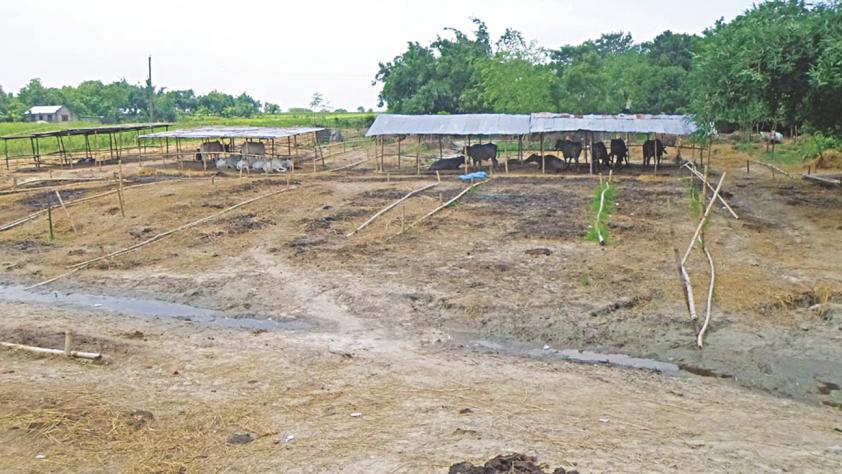The almost empty cow sheds in Bakher Ali area near the Bangladesh-India border late last month. Even a few months ago, the sheds were full of cattle brought from India. The illegal supply of cows dried up recently after Border Security Force stepped up security along the border.
India doesn’t export and Bangladesh doesn’t import, yet the age-old cattle trade goes on and it accounts for nearly $1 billion business a year. Up against cow slaughter, the ruling BJP in India has recently choked the illegal supply channels to Bangladesh. New dynamics that followed: RSS guarding the borders, border guards becoming suddenly reluctant to be partners in the crime and smugglers looking for other goods. With the clandestine business almost coming to a grinding halt, The Daily Star, in its 3-part series, will focus on the impact on life and livelihood across the border.
Apart from the Indian Border Security Force, members of Hindu nationalist group Rashtriya Swayamsevak Sangh (RSS) are active along the India-Bangladesh border to check supply of cows to Bangladesh through informal channels.
RSS members are catching cattle smugglers and handing them over to the BSF and police in bordering districts of West Bengal, the main cattle smuggling route to Bangladesh, according to RSS units in the districts.
RSS South Bengal Unit General Secretary Jishnu Basu said their activists were working along the border to prevent cow smuggling.
“Our members are conducting campaigns to stop it,” said the leader of the RSS, the ideological mentor of the ruling Bharatiya Janata Party (BJP) in India.
As India, which has the largest cattle population in the world, doesn’t export cows to any country, illegal trade of cattle has flourished along the Indo-Bangla border over the years. And cows brought in from India through informal channels meet most of Bangladesh’s demand for beef.
Along the porous border with West Bengal, cattle smuggling, often by criminal gangs, raises hundreds of millions of dollars annually in illicit profits.
The illegal trade is so lucrative that many locals risk their lives and indulge in it to make a fast buck.
According to Reuters, illegal cattle trade between the two countries accounts for $600 million a year. However, the Christian Science Monitor put the figure at $920 million, quoting experts.
If cattle supply from India comes to a halt, Bangladeshi consumers would not be the only sufferers. India will also be burdened with an additional expenditure of more than Rs 31,000 crore (Tk 38,769 crore) annually, as about 1.25 crore cattle have to be taken care of annually till they die naturally, according to The Economic Times.
Many Indian nationalist and religious groups have been advocating a ban on cow slaughter in the Hindu-majority country. In Hindu culture, the cow is regarded as a sacred animal.
Since Hindu nationalist party BJP came to power in India last year, it took a bold stance against cow slaughter as well as cattle smuggling.
Days after advocating a nationwide ban on cow slaughter, Indian Home Minister Rajnath Singh on April 1 this year asked BSF jawans on the Indo-Bangla border to put a stop to cattle smuggling so that people in Bangladesh give up eating beef.
Sources said BSF jawans seized around 90,000 cattle and arrested some 400 smugglers in bordering districts of West Bengal in the last six months.
SK Tiwari, BSF deputy inspector general for South Bengal, confirmed the seizure and the arrest of smugglers, but didn’t give any numbers.
Bhaskar Mukherjee, additional superintendent of police in Uttar Chabbish Pargana, said they were carrying out drives to arrest smugglers and seize cattle.
Idris Ali, Trinamool Congress lawmaker from Bashirhat of Uttar Chabbish Pargana, said West Bengal Chief Minister and party Chairperson Mamata Banerjee, on several occasions, had voiced her strong stance against cattle smuggling through the border.
Seeking anonymity, a cow smuggler at Bashirhat, a major cattle smuggling route, said he had been without income for the last few months.
“Truck owners and drivers are not willing to carry cows meant for transporting to Bangladesh as these trucks are seized and the drivers are arrested.”
According to Bimal Pramanik, an independent researcher in Calcutta, most of the illegal trade takes place through West Bengal and more than two million cows are smuggled to Bangladesh every year.
KG Moazzem, additional research director of Centre for Policy Dialogue, however, told The Daily Star that the number would be around 1.5 million.
Pramanik told the Christian Science Monitor that three out of every four cows slaughtered in Bangladesh are from India.
“If Indian cows don’t reach Bangladeshi slaughterhouses, there will be a big crisis there,” he said.
The impact is already visible in Bangladesh. The drop in supply has pushed up beef prices across the country.
The retail price of beef has gone up by Tk 80-100 a kg to Tk 400 at the capital’s kitchen markets since April. State-run Trading Corporation of Bangladesh (TCB), however, puts the price at Tk 370-380 a kg.
In February, consumers could buy the same quantity of beef for Tk 280-300, according to the TCB that monitors daily prices of commodities.
Syed Hasan Habib of Bengal Meat, a leading manufacturer of meat products, told Reuters recently that they were forced to close two processing units, as prices of cows had gone up by 40 percent over the last few months because of India’s move.
Another senior executive of the company said they had to hike prices of all beef products because of rising prices of the red meat.
According to World Health Organisation, per capita meat consumption in Bangladesh is one of the lowest in the world.
Protein intake here is already far below the global average. Per capita annual intake of meat is around 80 kg in the world, while it is only 7.3 kg in Bangladesh.
If beef goes off the menu for most Bangladeshis, their protein intake would take a blow, say experts.
Source: The Daily Star

